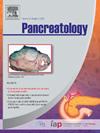TSH作为高甘油三酯血症性胰腺炎复发的新生物标志物:一种将脂质失调与炎症联系起来的临床预测工具。
IF 2.7
2区 医学
Q2 GASTROENTEROLOGY & HEPATOLOGY
引用次数: 0
摘要
背景:随着饮食习惯的改变,高甘油三酯血症诱发的急性胰腺炎(HTG-AP)患者呈逐年增加趋势。与其他病因相比,HTG-AP患者发展为严重疾病的可能性更高,且复发风险明显增加。目前,迫切需要建立和完善有效的HTG-AP复发预测模型,这对改善患者预后具有重要意义。方法:本研究共纳入429例HTG-AP患者。采用LASSO回归选取变量,构建Logistic回归预测模型,并通过ROC曲线、标定曲线和决策曲线分析(DCA)对模型的性能进行验证。结果:促甲状腺激素(TSH)、甘油三酯(TG)水平升高、女性、年龄bb0 ~ 33岁为独立危险因素(P < 0.05)。进一步的饮食回顾性研究发现,复发HTG-AP (RAP)组脂肪和碳水化合物的摄入量显著高于原发性HTG-AP (OAP)组(P < 0.01),而盐的摄入量则明显低于原发性HTG-AP (OAP)组(P < 0.01)。结论:TSH升高可能是HTG-AP复发的独立危险因素。此外,基于TSH水平的新nomogram模型预测HTG-AP复发的准确率较高,有望为临床预防和治疗提供一定的帮助。本文章由计算机程序翻译,如有差异,请以英文原文为准。
TSH as a novel biomarker for recurrence of hypertriglyceridemia pancreatitis: a clinical predictive tool linking lipid dysregulation to inflammation
Backgrounds
With the change in dietary patterns, the number of patients suffering from hypertriglyceridemia-induced acute pancreatitis (HTG-AP) has been increasing year by year. HTG-AP patients have a higher likelihood of progressing to severe conditions and exhibit a markedly increased risk of recurrence compared to other etiologies. At present, effective prediction models for the recurrence of HTG-AP need to be established and improved urgently, which is of great significance in improving the prognosis of patients.
Methods
A total of 429 HTG-AP patients were included in this study. Variables were selected by LASSO regression to construct a Logistic regression prediction model, and the performance of the model was verified by ROC curve, calibration curve and decision curve analysis (DCA).
Results
Elevated Thyroid-stimulating hormone (TSH) and triglyceride (TG) levels, Female and Age >33 years were identified as independent risk factors (P < 0.05). A further dietary retrospective study found that the intake of fat and carbohydrate in the recurrent HTG-AP (RAP) group was significantly higher than that in the primary HTG-AP (OAP) group (P < 0.01), while the salt intake was much lower.
Conclusion
Elevated TSH was likely to be an independent risk factor for HTG-AP recurrence. In addition, the new nomogram model based on TSH level shows high accuracy in predicting HTG-AP recurrence, which is expected to provide certain help for clinical prevention and treatments.
求助全文
通过发布文献求助,成功后即可免费获取论文全文。
去求助
来源期刊

Pancreatology
医学-胃肠肝病学
CiteScore
7.20
自引率
5.60%
发文量
194
审稿时长
44 days
期刊介绍:
Pancreatology is the official journal of the International Association of Pancreatology (IAP), the European Pancreatic Club (EPC) and several national societies and study groups around the world. Dedicated to the understanding and treatment of exocrine as well as endocrine pancreatic disease, this multidisciplinary periodical publishes original basic, translational and clinical pancreatic research from a range of fields including gastroenterology, oncology, surgery, pharmacology, cellular and molecular biology as well as endocrinology, immunology and epidemiology. Readers can expect to gain new insights into pancreatic physiology and into the pathogenesis, diagnosis, therapeutic approaches and prognosis of pancreatic diseases. The journal features original articles, case reports, consensus guidelines and topical, cutting edge reviews, thus representing a source of valuable, novel information for clinical and basic researchers alike.
 求助内容:
求助内容: 应助结果提醒方式:
应助结果提醒方式:


